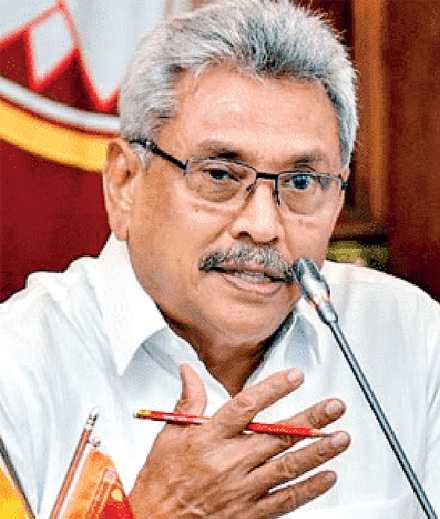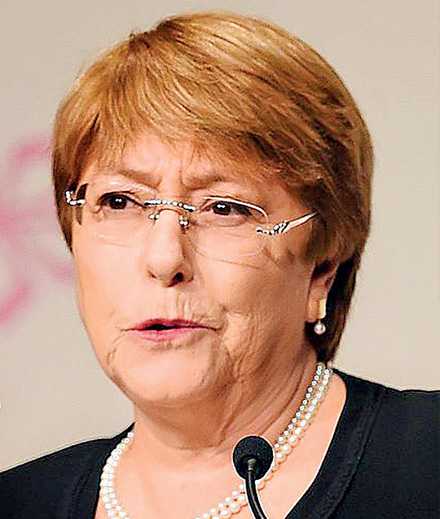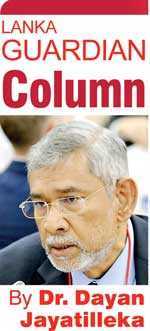Monday Feb 23, 2026
Monday Feb 23, 2026
Tuesday, 23 February 2021 00:25 - - {{hitsCtrl.values.hits}}

We have an unjust peace not least because current President Gotabaya Rajapaksa (beginning with his long stint as Secretary/Defence) and his ex-military inner circle never fully committed to the concept and criteria of a Just War (‘jus in bello’, not only ‘jus ad bellum’) and saw the war instead as a Holy War

High Commissioner Michelle Bachelet’s report as well as the plethora of joint statements and reports that have preceded the current session of the UNHRC demonstrate, despite factual and sometimes sweeping inaccuracies about the war, a cumulative soft power which combines a credible and compelling story
“There’s nothing in the world more powerful than a good story. Nothing can stop it. No enemy can defeat it” – Tyrion Lannister (Peter Dinklage), Game of Thrones, Final episode
 The challenge for Sri Lanka at the 46th UNHRC session is about how Sri Lanka has evolved since the war ended in 2009 and currently stands in relation to its environment, the world. The most important development has already taken place and that is in a crucial realm that encompasses ‘soft power’, ‘discourse’ and ‘legitimacy’. It is the realm of ‘the story’, the narrative, about Sri Lanka and Sri Lanka’s own official narrative addressed to the world.
The challenge for Sri Lanka at the 46th UNHRC session is about how Sri Lanka has evolved since the war ended in 2009 and currently stands in relation to its environment, the world. The most important development has already taken place and that is in a crucial realm that encompasses ‘soft power’, ‘discourse’ and ‘legitimacy’. It is the realm of ‘the story’, the narrative, about Sri Lanka and Sri Lanka’s own official narrative addressed to the world.
That battle of narratives has already been joined. The UN Human Rights High Commissioner’s Report, the Report of the UN Special Rapporteurs and the Open Letter of The Elders and other eminent persons, which includes two former heads of state—one being a Nobel Prize-winning former President—and a pool of retired top UN officials, the reports of Human Rights Watch and Amnesty International, all constitute a compelling story; a powerful discourse.
The UN Human Rights High Commissioner’s report as well as the plethora of joint statements and reports that have preceded the current session of the UNHRC demonstrate, despite factual and sometimes sweeping inaccuracies about the war, a cumulative soft power which combines a credible and compelling story, with a powerful moral indictment.
There are two argumentative intellectual axial thrusts: (i) prolonged impunity will set a bad example and trigger a global impunity pandemic and (ii) the dominance of ultranationalist militarism and the same figures implicated in/associated with egregious wartime violence will lead to resumption of the cycle of conflict.

Discourse is decisive
This discourse can be dismissed only by those who fail to understand how the world works and the standing of a country rises and falls. One can only hope there’s someone in the Gotabaya Rajapaksa regime who has either read Joseph Nye or at least watched the final episode of Game of Thrones. Prof. Joe Nye’s contribution has been to foreground the strategic importance of soft power, and to augment it with the concept of ‘smart power’ (by which he doesn’t mean IT or AI). Nye argued that a state’s long term power rests not only and not so much on its military strength (hard power) but on its appeal; the attractiveness and drawing power of its story way beyond its borders.
At a seminar at IFRI, the French Institute of International Relations, one of the world’s top think-tanks, I asked Joseph Nye whether his concept of ‘soft power’ did not derive from Antonio Gramsci’s notion of ‘hegemony’, which is distinct from ‘domination’ and combines coercion with consent. He acknowledged that it did, and that he would acknowledge it in his next book.
To illustrate how this works, Israel loses almost all UN votes, except for when it’s at the Security Council and the US exercises its veto on Israel’s behalf. Israel is an undeclared nuclear power. Cuba wins every vote at the UN, beating the USA. Cuba is nowhere as rich or as militarily strong as Israel nor has the open backing of a superpower. Why? Because Cuba’s story, its narrative, its discourse, has infinitely greater and wider, i.e., more universal, appeal. And why is that? Because Cuba has the facts and the arguments to prove that it holds the moral high ground, which Israel does not because it cannot.
How did this happen to a country, Israel, which, rightly or wrongly, fairly or unfairly, was admired by much of the world when it won the Six Day War in June 1967? It was the Occupation and annexationism that came afterwards. The war and the occupation are quite distinct, which is why there are many veterans of that war, and many spouses, sons and daughters of the heroes of that war (such as Leah Rabin and Yael Dayan) who are bitter opponents of the Occupation.
Nobody in the UN Human Rights Council attacks Russia over the bitterly-fought war against separatist terrorism in Chechnya (which involved bombing Grozhny). That’s not simply because Russia is a Great Power which has strategic parity with the USA. Russia gets called out, sometimes unfairly, on human rights issues all the time. Yet in contrast to Sri Lanka, it doesn’t catch flak for Chechnya because Moscow has long accorded it genuine autonomy, withdrawn troops (Russia’s troops had completed their withdrawal when Sri Lanka won its war in May 2009) and empowered an elected ethnic ally. Sri Lanka didn’t and hasn’t.
Harvard Prof. Joe Nye’s thesis of “soft power” has as a corollary, though not a derivative, the strategic perspective of Princeton’s Prof Emeritus Richard Falk, who argues that countries and peoples that are vulnerable (Nicaragua in the 1980s, the Palestinians for decades) should fight a “legitimacy war” using “lawfare”—legal warfare—which targets the moral-ethical Achilles Heel of their vastly stronger enemies. Falk advocates taking ‘Justice’ as the key demand and building trans-state, legal and moral counter-power.
This is what is happening to Sri Lanka today. It wasn’t always so. Numerous international studies of how Sri Lanka beat the doctrine of R2P and the norms of the liberal international order at the UNHRC in 2009, conclude that the strong suit of the Sri Lankan side was its “discourse”; its successful synthesis of soft power. To give but a single example, in her book ‘War, Denial & Nation-Building in Sri Lanka: After the End’ (Palgrave Macmillan, London 2017), Rachel Seoighe identifies the 2009 Sri Lankan diplomatic “discourse strategy”, involving “combining” and “shrewd adaptation of international discourses”. (For a summary of the findings in the literature see: Sri Lanka in Geneva May 2009: International Scholarly Assessments & Interpretations- Colombo Telegraph)
By contrast, Sri Lankan discourse degenerated in the postwar decade into an alternation/ combination of three discourses—paranoid anti-Americanism/infantile leftism, truculent nativism and abject capitulationism—reflecting changes in the ethos of the state.
Sri Lanka’s soft power; its capacity to appeal to, persuade and convince diverse others, is down to an all-time low. Not everything can be ‘homegrown’ because somethings just don’t grow at home, and not everything that is ‘homegrown’ can be exported. Though the Ramayana travelled, the Mahavamsa didn’t. A country cannot proclaim the “homegrown” at the UNHRC and convince, precisely because the UNHRC is not predicated on nativism but on the recognition of the transcendent universality of Human Rights.

War and postwar
History shows that the character of a postwar order does not invalidate the legitimacy or illegitimacy of a war. Germany’s and Japan’s postwar successes do not shed a kindlier light on the evil of the Axis powers. Conversely, the horror of Pol Pot and the ghastliness of Mugabe do not invalidate the legitimacy of the Cambodian and Zimbabwean wars of liberation. The legitimacy of the French, Russian and Chinese Revolutions were not diminished in the eyes of even the tragic heroes who were victims (Danton, Trotsky, Lin Biao) by the post-revolutionary regime practices further downstream. Similarly, what Sri Lanka has become and is becoming in the postwar years, ably described and documented by Bachelet, the Special Rapporteurs, the Elders et al., does not overturn the basic legitimacy of Sri Lanka’s war against terrorism and for territorial reunification.
It is true that there almost certainly were war crimes committed by both sides, but as WWII amply proves, that doesn’t alter the very character of the war fought legitimately by one side and illegitimately by the other. However, the story doesn’t stop there. If the war crimes committed by the state are not independently investigated and justly punished, and if such impunity proves to be a protracted phenomenon, it becomes just as much a part of the history of the war as the valorous victories. Though that may not be the methodology of the historian, it is certainly the habit of the global public imagination, especially of younger generations, to view the war through the prism of the injustices committed against the unarmed/disarmed. That is what has happened in the case of Sri Lanka. That is why Sri Lanka is the accused today.
Lakshman Kadirgamar introduced me to Philip Gourevitch who was at the time the Editor of the New Yorker. Gourevitch was of course famous for his book on Rwanda. In the brilliant long report, he wrote on Sri Lanka in the August 1st 2005 issue of the New Yorker, he gave a full column of space to his conversation with me. Our friendship was cemented when he interviewed me for New York Public Radio when I was in the US, and of course, by our shared feelings for Lakshman Kadirgamar who was assassinated a fortnight after the New Yorker story appeared. We met again in Paris, where I was serving in the postwar years. He had switched from the New Yorker to the editorship of the Paris Review.
Gourevitch told me that global public opinion, including in the circles he worked and moved in, changed adversely towards Sri Lanka not when it won the war, defeating the Tigers and killing Prabhakaran, but when it started to see pictures of Tamil women, children and old men who had been held behind barbed wire, with armed guards outside, for many months. The Sri Lankan Government just didn’t care about the optics. That’s when we started to lose the moral high ground.
The Archbishop of Canterbury
The ongoing UNHRC session has triggered memories in those who witnessed its dialectic with Sri Lanka in the war years. Gehan Gunatilleke recently referred to his Geneva 2008 memories. My own take me to early May 2007 and an indelible exchange with the (then) Archbishop of Canterbury Dr. Rowan Williams, who was paying a call on President Mahinda Rajapaksa.
President Rajapaksa had brought me in to meet visiting US Assistant Secretary of State Richard Boucher and the meeting had a testy moment when Boucher asked the Sri Lankan state to desist from using ‘Tamil paramilitaries’. Douglas Devananda was among those at the meeting. With a glance at MR and a barely perceptible nod from him, I politely interjected that the USA had been using paramilitaries, referred to as ‘local allies’, in many theatres of war including Afghanistan. I mentioned Rashid Dostum.
There were two meetings that President MR hosted back-to-back, and the second was very different from the first. The Archbishop of Canterbury Dr. Rowan Williams (who currently teaches Contemporary Christian Thought at Oxford and Cambridge) was the second guest. The atmosphere changed as the cultured Archbishop with a deserved reputation for his stellar intellect, posed with utmost civility some very searching and fundamental questions about the war. This time the President openly asked me to field them.
I answered as sincerely as I could, that the war we had been forced into by the Tigers met all the criteria of the Christian theological doctrine of Just War, and went on to explain. My explanation must have had some credibility because at the media briefing that day the Archbishop made a statement that in the defense against terrorism the surgical use of the military option would be unavoidable. That raised a howl of protest from the UK-based Tamil diaspora. But my story is not about how I may have presented a persuasive case. Rather it is about Dr. Rowan Williams’ counter-question to me, how I answered it, and how, in the longer view, he has proven more correct than I, though I still stand by the point I made.
Listening to me make the case on Just War, Dr. Rowan Williams made the following point and posed a question. He said that he and a group of theologians had been revisiting Just War theory and while he could see my point, he wished to inform me that they were in the process of developing a new concept as counterpart and corollary to Just War. That concerned the outcome of a Just War: the problem of ensuring a Just Peace.
“Do you think that the Just War as you have argued it is, will lead to a Just Peace—and why so?” the Archbishop of Canterbury asked me squarely, with President Rajapaksa leaning forward with complete concentration. I answered: “when the army retakes the North and East, the state will, if only as an exercise in legitimation, have to hold elections thereby reopening democratic space which will be filled by the elected representatives of the Tamil people, who will then press home the grievances and aspirations of those people. In that sense the Just War will open a process that eventually enables a just peace.”
That has been proven true to some degree, but hopelessly inadequately so. There were sporadic sequences of horrifying injustice running through this Just War. The state hasn’t “addressed accountability” (as promised) for over a decade. Justice has not been done. In some cases, it has been undone.
The joint statements of 21 and 23 May 2009 and the pro-Sri Lanka UNHRC Resolution of 27 May 2009 were the foundation stones of a Just Peace. Rejecting unilateral statements and hostile resolutions is understandable, but retrenching from or blocking the implementation of the constructive pledges and positive resolutions of one’s own administration is appalling.
Sri Lanka cannot credibly criticise the UNHRC or the OHCHR for overlooking the LLRC and Paranagama Reports—with Sir John Holmes’ impregnable annexure—because the Government itself failed to implement their accountability recommendations and is still not committed to doing so.
The postwar prospect is at its grimmest today, judging by the recent remarks of a leading ideologue of the Gotabaya camp, Prof. Rohan Gunaratna:
“…Like India considers Kashmir an internal affair, the 13th Amendment is an internal affair of Sri Lanka. If foreign governments destabilise the North and East, Sri Lanka will repeal the provincial council system the very same way India abrogated the special status of Jammu and Kashmir…
…It is not too late for the Government to discipline the NGOs...” (Ceylon Today, 20 Feb 2021)
While Sri Lanka fought a Just War, there is manifestly no Just Peace. What we have is a structurally—and increasingly, systemically—Unjust Peace. The State-driven re-engineering of cultural-civilisational heritage in the Eastern Province may be a UNESCO issue.
We have an unjust peace not least because the current President (beginning with his long stint as Secretary/Defence) and his ex-military inner circle never fully committed to the concept and criteria of a Just War (‘jus in bello’, not only ‘jus ad bellum’) and saw the war instead as a Holy War, with the State’s armed forces entitled to immunity and a large share of State power, due to the immanent meritoriousness of their engagement.
The unresolved contradiction turned chasm between Just War and Unjust Peace, a prospect raised by the Archbishop of Canterbury in the presence of President Mahinda Rajapaksa in Colombo, May 2007, is the crux of the challenge in Geneva and the heart of the larger Lankan tragedy.